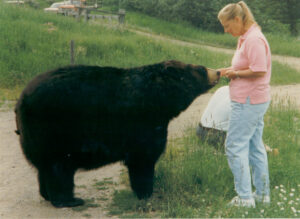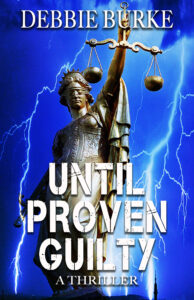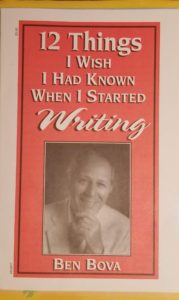For us writers, knowing what is outside of our control, and what lies within, can help with stress and anxiety when it comes to publication. Writing lies within our control, but over controlling our writing process can cause stress and anxiety as well.
Today’s Words of Wisdom tackles the issue of control. Michelle Gagnon shares a few of the many things outside of your control when it comes traditional publication. James Scott Bell looks at more things in publishing outside of our control, including whether we become “A-list” writers, and offers a crucial piece of advice. Finally Sue Coletta looks at a powerful part of our mind that is outside of our conscious control, but which we can work with in flow state, and shows how to create that state.
All three posts are well-worth reading in their entireties and can be found linked to the original publication date at the bottom of their respective excerpts.

Typos: I’m not saying I’m perfect, but occasionally glaring typos appear in the text that were in no draft of the manuscript I submitted. My book club read The Tunnels, and when I walked in for our meeting three people shouted out, “Page 67! What happened there?” Half of the night was consumed by a discussion of some of the typos in the book. Somewhere between my final edits and the typesetting process, new typos appeared. Again, beyond my control (also the reason why I never crack the spine to read the final product. I have never once read one of my books after mailing off the line edits, because if I spot a typo it drives me nuts).
Missing Pages: I received emails from a few people who purchased Boneyard, only to discover that fifty pages were missing from the middle of the book. After talking to other authors, I learned that this is not that unusual. A glitch at the printing plant can ruin a whole batch of books. Fortunately, publishers are wonderful about shipping out a replacement copy, if it ever happens to you.
Print Runs: This can be make or break for an author. Say your initial print run was 20,000 books. Sell 15,000, and your book is a success story. But if the publisher printed 100,000 copies, and you sold 15,000, your book would be considered a dismal failure and you would be facing an uphill battle to get the next one published. Not fair, right? But as an author, you have no say in whether your print run is five thousand books or five million. You have to just keep your fingers crossed that your publisher’s sales projections are right.
I will say that in book publishing, I still have far more control than I ever did as a magazine writer. Back then, I’d hand in an article and six months later, something came out with my name on it that was virtually unrecognizable. Not always, but frequently enough to be depressing. In book publishing you are definitely allowed a firmer hold on the reins.
Michelle Gagnon—May 6, 2009
Not every writer who is good enough to be on the A List makes it to the A List. There’s an element built into nature that leaves some things to pure chance.
The trick in life is not to stress about those things.
That is the essence of the Stoic philosophy. Epictetus put it best: “There is only one way to happiness and that is to cease worrying about things which are beyond the power of our will.”
You got that right, Epic. Most writers worry about every single aspect of every single book release.
Will it sell? Will it be seen in bookstores? Will the critics/reviewers hate it? Will it land on a major bestseller list? Will I get that literary award I’m lusting after? Does Oprah have my phone number?
None of these things can you control.
Thus, the writer determines to do everything within his power: bookmarks, swag, panels, bookstore signings, blog tour, Facebook ads, Amazon ads, Bookbub ads, tweets, ’grams, howling at the moon—all the while stressing over the results.
But when the dust settles down, down to the lower depths of the Amazon rankings, what then? If the author has too much emotional investment in great expectations, he will suffer needless inner turmoil. It can hamper or even end a writing career. Many a writer has called it quits after a third or fourth book got remaindered within a month and the publisher did not offer another contract.
To repeat: Not everyone who should be a star becomes a star.
Not every writer who should be on the A List makes it to the A List.
But anyone who keeps writing is a writer. And that very act—the writing, falling deeply into a scene, getting into “the zone”—turns out to be the only real antidote for writerly anxiety.
So put this on a sign or sticky note on your desk:
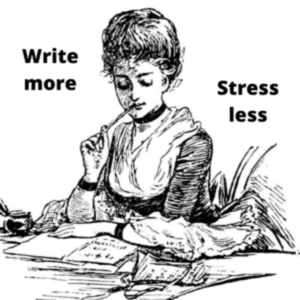
James Scott Bell—March 15, 2020
The conscious you, or conscious awareness, makes up the smallest part of your brain. The conscious brain believes it’s in full control of the body, when nothing could be farther from the truth…
When our conscious awareness relinquishes control to our unconscious brain, we enter the flow state—a form of brain activity experienced by different kinds of people, from elite athletes and meditation experts to professional writers and musicians. Many of whom call this state “the zone,” which arrives during total emersion in a task. In flow states, neural circuits run without conscious mind interference. Our perception clears, our unconscious awareness heightens, and feel-good chemicals flood the brain, which allows for intense focus and gratification…
Tips to Achieving Flow
- Balance challenge and skill.
If you’ve never written nonfiction, for example, you may find it difficult to enter the zone because your conscious awareness is stressed out. You’re too afraid of making a mistake to enter flow.
If something isn’t challenging enough, you’ll get bored easily. In turn, so will your reader. Not only will adding plenty of conflict improve your plot, but you’ll enter the zone quicker while writing.
1. Establish clear goals.
I will write for three hours. I will write at least 1000 words today. I will write two scenes or one chapter. By establishing a daily writing goal, it relieves the pressure of having to finish the entire first draft by a certain date. How you choose to establish those goals is up to you.
2. Reduce distraction.
You will never enter the zone if you’re checking for social media notifications or email every ten minutes. When it’s time to write, write. Save play time and the inbox for later.
3. Stop multitasking.
Have you ever turned down the radio while searching for a specific house number or highway exit? You’re instinctively helping your brain to concentrate on a visual task. For more on why multitasking is so difficult and why we should avoid it before a writing session, see my 2021 post entitled Can Multitasking Harm the Brain?
4. Don’t force it.
Some days, you’ll enter the zone. Other days, you won’t. It’s okay. Don’t worry about it. You’ll still produce words and make progress.
5. Enjoy the process.
You won’t enter flow unless you’re enjoying yourself. Simple as that. If you view writing as a chore, it may be time to step away from the WIP for a while. Yes, penning a novel is hard work, but it also should be enjoyable. If it’s not, you may want to ask yourself why you do it.
Sue Coletta—January 8, 2024
***
- What are some things you see as outside of your control in writing/publishing?
- How do you deal with these?
- Do you work with your unconscious to help get into flow state? Any tips?
I’ll be on the road for much of today, and will check in when I can. In the meantime, please feel free to comment.









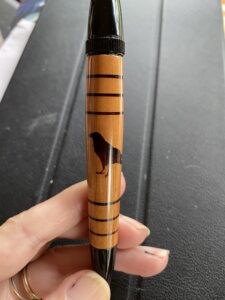 Check out the amazing “Poe Pen” Steve created for monthly giveaways for
Check out the amazing “Poe Pen” Steve created for monthly giveaways for 
